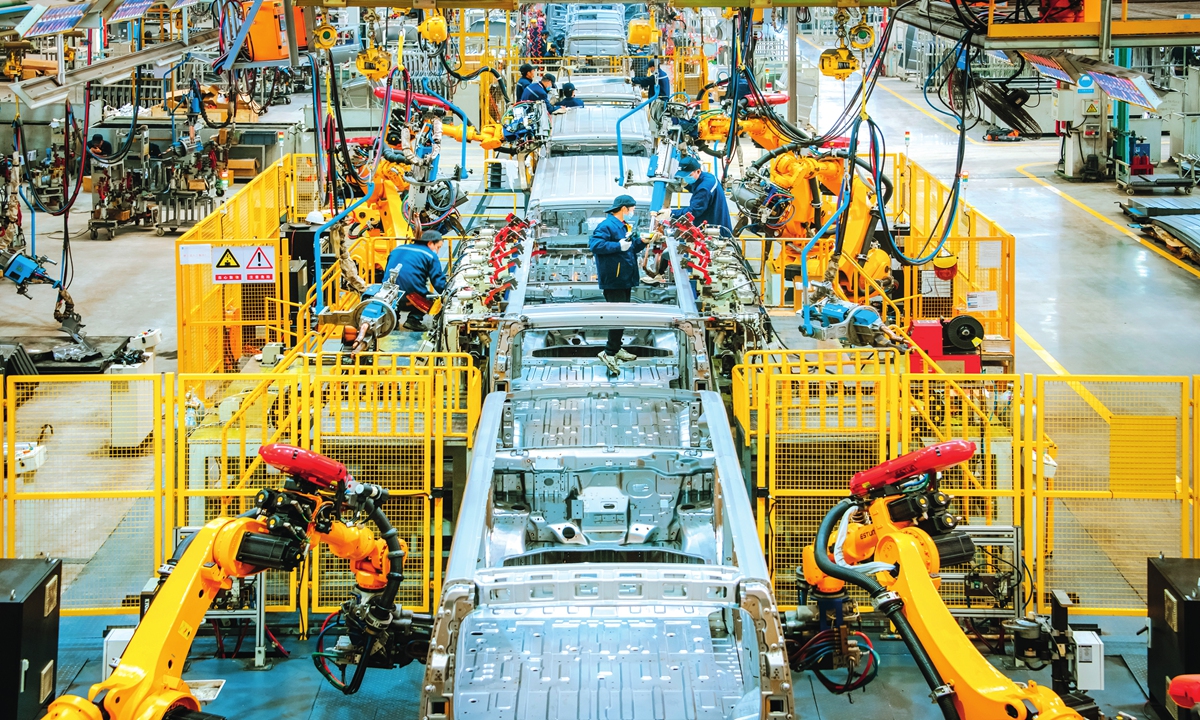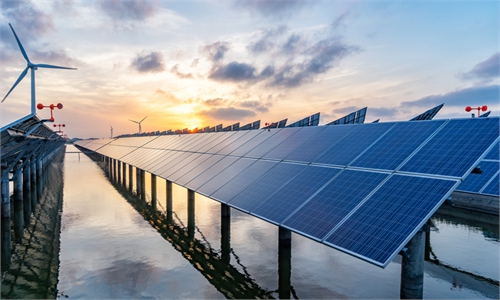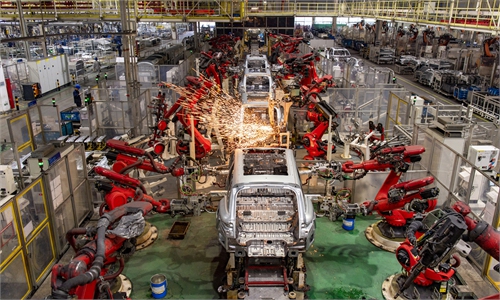Chinese NEV industry insiders refute 'overcapacity' fallacies, highlight investment in innovation

Staff members from a local NEV enterprise catch up on orders on the production line in Ganzhou, East China's Jiangxi Province on December 26, 2023.Photo: VCG
The US tariff hike on China's new-energy vehicles (NEVs) constitutes an unjust action that violates WTO rules, top Chinese scientists and business leaders said on Tuesday. They also refuted the recent "overcapacity" rhetoric hyped by some Western officials and media outlets, saying the claim fails to align with development logic and the actual status of the industry.
The rapid growth and competitive advantages of China's NEV sector are rooted in China's vast domestic consumer market and continuous endeavors in technological research and innovation, Wang Zhang, chief scientist at renowned carmaker Beijing Automotive Group (BICA), told the Global Times during an industry forum held in Beijing.
The forum, organized by the China Public Diplomacy Association (CPDA), aimed to introduce the latest developments, applications, and global significance of China's NEV technology. It featured experts in low-carbon transportation and business delegates from leading Chinese NEV manufacturers.
Chinese NEV companies have made substantial strides over the past few years, primarily driven by huge investment in key technologies such as intelligent cockpits, autonomous driving, and ultra-fast charging, said Zhao Yuhui, vice president of Geely's EV brand Zeekr, noting that this has ensured China's competitiveness in the global market.
Zhao also highlighted China's advanced road infrastructure and varied vehicle usage scenarios, which allow for ample market feedback, fostering the companies' technological innovation. "In this favorable context, the sector's rapid advancement is an inevitable consequence of sustained investment and market dynamics," he said.
Regarding so-call overcapacity claims, Wang said that in China's market economy, business decisions are driven by market demand, not the blind pursuit of production capacity. Outdated capacities should be phased out or upgraded, but they are unrelated to the country's NEV production, he said.
In April, China's NEV retail sales reached 674,000 units, up 28.3 percent year-on-year, while the domestic retail penetration rate rose to 43.7 percent. In addition, from January to April, China's passenger vehicle exports increased by 37 percent year-on-year, with NEV exports up 26.8 percent year-on-year, accounting for 27.9 percent of April's car exports, showcasing the growing demand from both the domestic and the global market.
Wang noted that the rapid growth of China's NEV sector since 2020 suggests overcapacity is not feasible within such a short timeframe. There are certain areas, such as the supply of high-quality and high-level key components, where undercapacity exists instead, according to Wang.
Zhao mentioned Zeekr's charging network business as an example. "In China, we still need public charging facilities due to a lack of home charging options. China's home installation rates for charging networks are far below those of developed countries. It shows the market is far from saturation, and there is still a significant gap between supply and demand."
Regarding the US' tariff hike, Wang emphasized that WTO regulations govern the fundamental rules of global trade. He urged every WTO member to adhere to WTO trade rules, and ensure that trade arrangements operate within this framework, despite the potential for global competition.
Chinese officials have also firmly refuted so-called overcapacity accusations. On Monday, a spokesperson for China's Foreign Ministry said that China's economic achievements over the past four decades were based on the success of the reform and opening-up period, and the effective combination of market mechanisms and the government's role.
The ministry blasted the overcapacity rhetoric as a "discriminatory approach" toward China and Chinese businesses, which has distorted the market.
Global Times



